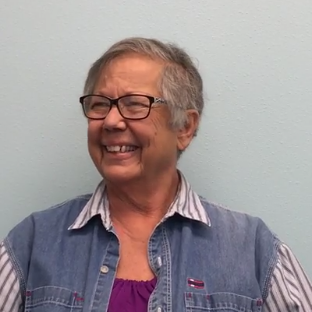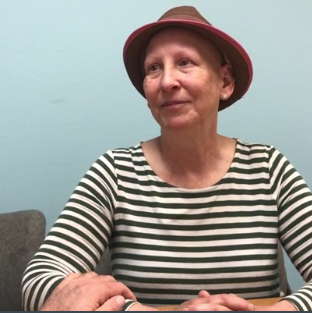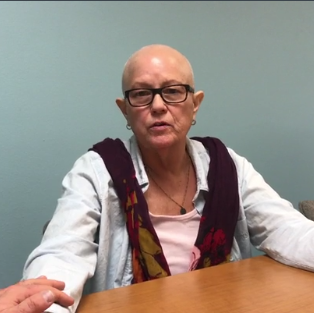There are many cancer treatments, a common one being chemotherapy. If you’re considering chemotherapy (“chemo”) as a treatment for your gynecologic cancer, it’s a good idea to learn about the treatment and what to expect. Here are some of the questions our patients often ask us about chemotherapy.
1. What is Chemotherapy?
Chemotherapy is a drug-based treatment that kills fast-growing cells. It is most often used to kill cancer cells, which grow more quickly than other cell types. Chemotherapy can be the primary way your cancer is treated or combined with other treatment types. While chemotherapy has long been used in cancer treatment, it can damage other healthy cells and cause short- and long-term side effects.
Tip: Ask your doctor about chemotherapy as well as what other treatment types you might also undergo.
2. What is the Goal of my Chemotherapy?
The goal of your chemotherapy will depend on your type of cancer and how advanced it is. Your doctor might use chemotherapy to eradicate your cancer. Or they might use it to shrink a tumor so that other treatments such as radiotherapy can be used. Sometimes chemotherapy might be used to reduce the size of a tumor to help relieve symptoms and improve quality of life.
Tip: Talk to your doctor about the goal and expected outcomes of your chemotherapy.
3. What Does Chemotherapy Treatment Look Like?
Chemotherapy can be administered in several ways: through an IV, an injection, a spinal fluid injection, or an oral pill. Some of these treatment types can be done at home, while others will be performed at an outpatient clinic or hospital.
Chemotherapy is usually given in cycles, with a “rest” period between cycles. Cycles usually last from 1-4 weeks, and you can expect to undergo multiple cycles. Depending on how you receive your chemotherapy, your treatment might take just a few minutes or several hours.
Tip: Talk to your doctor about what kind of treatment schedule to expect.
4. What Kind of Side Effects Can I Expect?
Chemotherapy cannot distinguish between a cancer cell and a healthy cell. This means that healthy cells can be damaged during treatment, causing side effects ranging from discomfort to severe illness. Sometimes side effects can be significant enough that treatment has to be paused.
The most common side effects of chemotherapy are fatigue, hair loss, nausea, vomiting, and low white blood counts. Low blood counts, together with reduced nutrition, can suppress the immune system, putting patients at greater risk of illness and infection. However, in recent years many new treatments have been developed to help manage the side effects of chemotherapy.
Tip: Ask your doctor about how to prepare for or manage side effects.
5. Who Will Be on My Care Team?
Your chemotherapy team will consist of a dedicated group of professionals who will help you through your treatment regimen. Your team will typically include your oncologist, oncology nurse, oncology physician assistant, pathologist, radiologist, pharmacist, dietician, and counselor. You will engage more often with some of these team members than others. In some instances, such as if you’re receiving your chemotherapy treatment at home, family members or friends might also help.
Tip: Ask your doctor about your care team, roles, and any important points of contact.
6. How Much Will It Cost?
The cost of chemotherapy will depend on the type and length of treatment, whether you’re involved in a clinical trial, and whether you are covered by insurance, the VA, or Medicare/Medicaid. You might also need to consider the costs associated with reduced or lost employment. However, there are many programs and funds available to help cover some of the expenses related to treatment.
Tip: Talk to your insurance company and care team about your financial needs.
7. What Is a Clinical Trial?
Some clinics and hospitals participate in clinical trials. These test new drugs, approaches, or methods to treat cancer. Clinical trials give patients access to high-quality care and market-leading treatments and may cover some or all treatment costs. However, clinical trials might not offer improved outcomes or might not work in your case. Some might not be covered by your insurance.
Tip: Talk to your doctor about clinical trials and whether they’re the right option for you.
SWWO Is Here to Answer Your Chemotherapy Questions
At SWWO, we’re here for our patients every step along the way – and around the clock. If you have received a gynecologic cancer diagnosis and have questions about chemotherapy treatment, talk to our team today.
TESTIMONIALS

“She made sure I understood everything. If I had questions after hours, I could always call her on her cell. I never felt like I was a burden. I know Dr. Finkelstein is here for me.”

“I was very impressed when I met Dr. Finkelstein. She was relatable. She has two young children and a career. I have two young children and a career.”

“They were very empathetic, very knowledgeable, very efficient and they are my friends today. I love them all. I come in here just to say hi to everybody and Dr. Finkelstein. I have complete and total trust in her and her abilities. Everything she has told me and done is just above board and I have complete faith in her.”

“I was so comforted and excited to have someone listen and hear what I had to say and actually supported me. I appreciated the balance immensely of true knowledge and willingness to be open to what I was finding in regard to alternative medicine.”

“I’m grateful that Karen came into my life. She has so much integrity and love for her patients and if you end up here you are in a good place.”
OUR MISSION
To help women triumph over their gynecologic and oncology needs in a warm and nurturing way.

